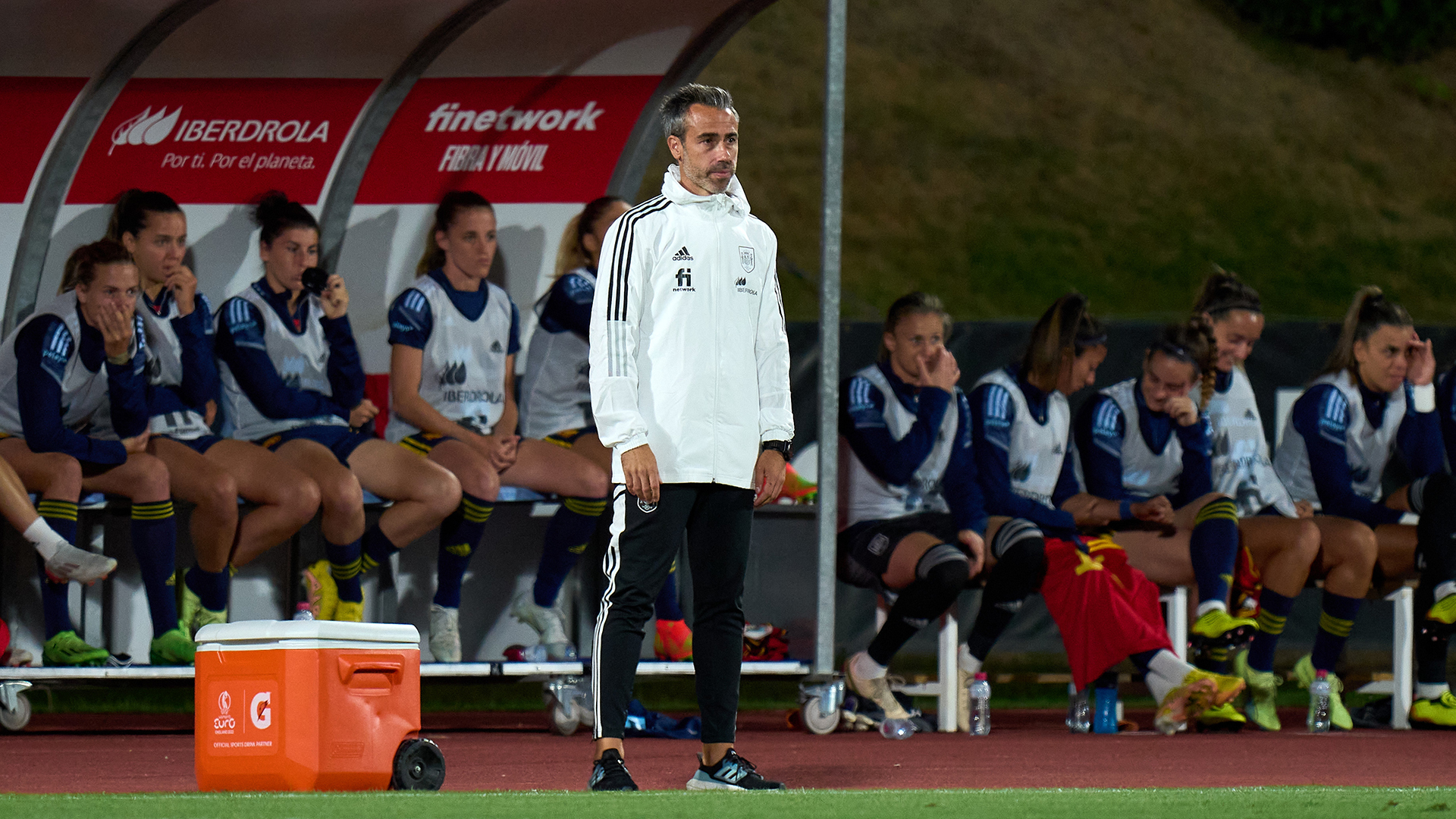Spain's women's national soccer team should be a team on the rise right now. Despite going out earlier than expected in this summer's Euros, Spain boasts some of the best players in the world, including a handful who ply their craft at the best club in Europe, Barcelona. With the next summer's Women's World Cup on the horizon, this should be a time to iron out some kinks and prepare for a serious run at the sport's top prize.
Instead, the women's team is in open and public disagreement with the Spanish soccer federation (RFEF) and its president, Luis Rubiales, over the tenure of Jorge Vilda, the manager of La Roja since 2015. On Thursday, the RFEF released a statement, claiming that 15 of the team's players sent letters demanding that Vilda be fired from his position, and that they would resign from the team if their demands were not met.
On Friday, the players released a joint statement of their own denying they had called for Vilda's firing, instead saying that the players want commitment from the federation towards a "professional project." The players said that they made this decision to demand change and refuse call-ups if change didn't come due to deteriorating mental and emotional health as a result of dealing with Vilda's poor management of the national team.
Though the players involved in the demand have not been made public, it has been reported that six of the players are from Barcelona's squad. According to El Laguero, those Barcelona players are Patri Guijarro, Sandra Paños, Mapi León, Clàudia Pina, Aitana Bonmatí, and Mariona Caldentey. Notably absent from the reported list are Irene Paredes, the national team captain, and Alexia Putellas, the reigning Ballon d'Or holder—though reports say both players support the rebellion. Putellas made her support clear when she tweeted out the team's joint statement on Friday.
— Alexia Putellas (@alexiaputellas) September 23, 2022
When confronted with a collective action from a majority of the national team squad—which, again, features some of the very best players in soccer—the Spanish federation has decided to double down on Vilda, in spite of his underwhelming results as coach. The RFEF has stated that it will not fire Vilda, and instead it is demanding that the 15 players apologize for the coordinated letters in order to be let back into the side.
If the players refuse to apologize, the federation implicitly threatened to ban the dissenters from the national team for two to five years, though the RFEF said it would not resort to that punishment just yet. For now, the players will not be called up for Spain's upcoming October games against Sweden and the United States, and the federation says it is committed to selecting players who want to be there, "even if they have to play with youth players."
The dueling letters between the federation and the players only scratch the surface of the current turmoil. According to the complaints from the players, Vilda's management has been subpar in all aspects, ranging from insufficient training sessions, questionable team selections, a lack of tactical sophistication, a lack of ambition, and poor management of injuries. The players raised these concerns to both Vilda and Rubiales ahead of this past summer's Euros, as they felt that if things continued the way there were the team would not win anything, and that the performance at the tournament, win or lose, would not effect any change to the overall conditions surrounding the team. Rather than address any of those concerns or even wait to see how the team performed, the federation extended Vilda's contract before the Euros even began.
After the Euros, the players again raised these same concerns, telling Vilda that his message was not getting through to the team and reportedly suggesting he resign for the good of the team. He did not resign. The group also brought their concerns back to the federation in hopes they would take action; according to Spanish journalist Sandra Riquelme, Rubiales's reaction was one of surprise and reiterated commitment to Vilda, essentially telling the players to know their place and not wade in on the manager's job status. After last week's World Cup qualifiers against Hungary and the Ukraine—both victories for Spain—the situation bubbled over, and the players sent the letters, leaving the situation in limbo for the moment.
As is often the case, you can find justification for the Vilda's puzzlingly ironclad standing with the federation in nepotism and cronyism. His father, Ángel Vilda, is a longtime presence in Spanish soccer. The older Vilda was a well-regarded physical trainer for clubs Atlético Madrid, Barcelona, and Real Madrid before he joined the RFEF, where he used his position to get his son Jorge jobs in the growing women's game. The deep roots of the Vilda name in the Spanish federation, and the loyalty that runs deep amongst those the federation favors, makes the dismissal of the unpopular Vilda a stickier subject than one might otherwise imagine. (An example of the importance of chummy relationships in Spanish women's soccer: No Real Madrid players signed the original letter, reportedly because the club expressly told them not to. Madrid's sporting director is Ana Rosell, who was once coached by Vilda before he joined the national team's youth setup.)
If any of this seems surprising, it's only in the way that a particularly strong case of deja vu feels surprising. Vilda is an underqualified, underachieving member of Spanish soccer's good ol' boys club. Most of his players believe he is an active hindrance on the national team's success, and yet the federation is stubbornly clinging to him in defiance of the strongest group of Spanish players in history. Vilda took over the job at the helm of the national team after a successful player mutiny of Ignacio Quereda, who was himself an underqualified, underachieving member of Spanish soccer's good ol' boys club. Most of Quereda's players believed he was an active hindrance on the national team's success, and yet the federation stubbornly clung to him in defiance of the players' wishes, only conceding and firing him when it was clear his position was untenable.
There was hope that firing Quereda and replacing him with Vilda—who, though he'd never managed a senior team before getting his current gig, did have success at the youth national team level—would signal a change. There was hope that the change was the mark of a federation and a country that was finally willing to get as serious and supportive and demanding of its women's national team as the players had long wished.
Instead, Spain is almost exactly where it was in 2015. The players are once again trying to drag the federation into modernity while the federation kicks and screams with the all rage and reasonableness of a spoiled toddler. There are certainly figures involved here who are acting like entitled children, and who deserve to be banned from the national team setup for the foreseeable future. Not included in those ranks are the players, who seem to be the only ones who actually care about the one thing this is all supposed to be about: the present and future success of Spanish soccer.






